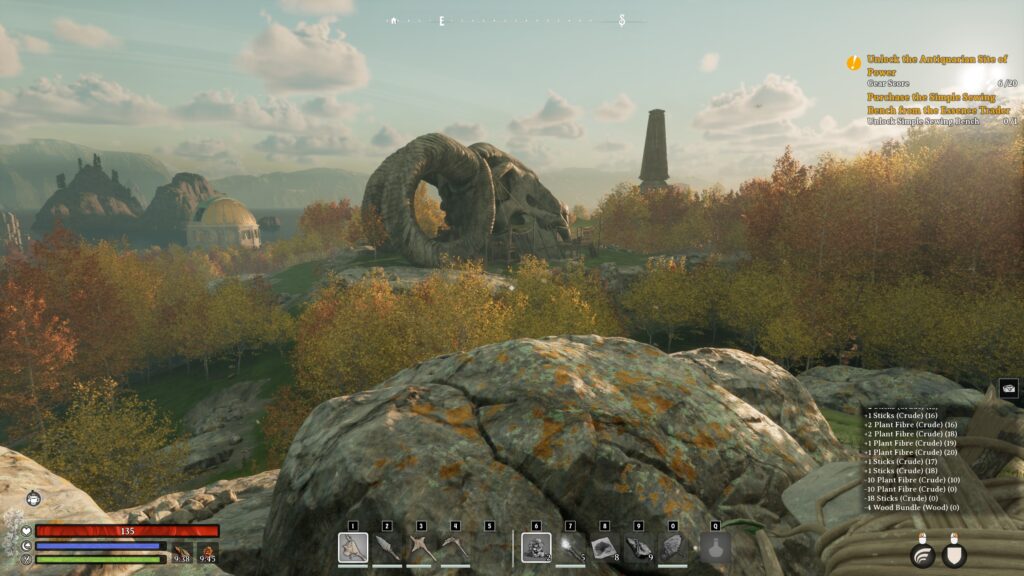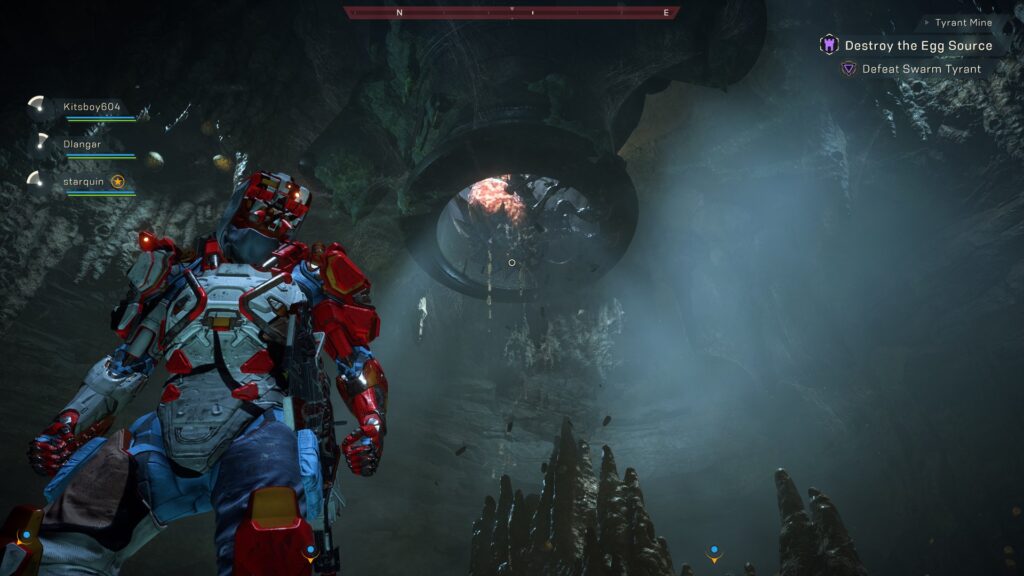I don’t really know what I want to say about this, but because of the brouhaha surrounding Nightingale’s reliance on always-connected servers and a somewhat recent article penned by someone with obvious buyer’s remorse who takes it out on an entire swath of technology, I thought this might be a nice space-filler for me, considering I am repopulating this blog now for the third damn time.

First, about Nightingale if you’re not apprised of the situation. Inflexion used to be part of another company, Improbable, who were crafting Nightingale to be a product built using Improbable’s “metaverse” platform called SpatialOS. The buzzwords inflected on us whenever some techbro goes glassy-eyed over talk of the metaverse could seem almost palatable when used in conjunction with Nightingale’s premise of being able to portal a character between different realms, but we’re not talking about going karting one moment and fighting zombies the next; Nightingale’s whole story is about moving between different landscapes with different properties, which is basically what metaverse proponents have been trying to shill since the word became prevalent enough to be obnoxious to sensible ears. When Improbable decided to withdraw from first-party game development, those who were working on Nightingale were amenably shipped off to Tencent. This move also resulted in the Nightingale moving from an MMO built on SpatialOS to a more traditional survivalbox game.
As with most survialbox games, Nightingale would allow people to play together, but as the game has a more traditional story aspect to it, the bulk of gameplay seems meant to be tackled solo. The curious bit with Nightingale’s current design is that Inflexion runs servers which allow players to interact, but clients connect even when players aren’t interacting, resulting in an always-on experience. This has resulted in some potentially down-letting situations such as long load times when passing between portals, lag, and client disconnects. Although some of these issues are not universal to all players, and it may be that some of the game’s key components such as procedurally generated realms benefit from beefy hosted servers, since it seems that most people are soloing the game many players are angry that their experience is being “held hostage” to issues caused by distant servers. To its credit, Inflexion has its ear to the ground and in their first announcement post-EA-release of Nightingale have acknowledged the uproar and have pledged to work on an offline mode as soon as feasible. In that letter, they claim that the group-play aspects were more technically challenging, and so the team took to solving those issues first, but that the desire for a single-player experience was misjudged. Beyond this seemingly overriding issue, Steam reviews are still mixed as many players seem to be forgetting or are opting to ignore what “early access” actually means. Par for the course, sadly, with Today’s Modern Gamer.
In my first draft of this post, I sided with the live-service camp, editorially. While I have encountered long loading times between realms in Nightingale, I haven’t had any other network related issues; in fact, I play the game exclusively through GeForce Now, so I’m doubly tempting fate. While looking around the Internet for search results on “live service games”, I have come a little closer to understanding the reason why so many pundits are claiming that “live service games are dying”, and while I cannot fault their connect-the-dots skills, I am not entirely convinced that they’re connecting those dots in the correct order.

These search results reminded me of how many live service games have come and gone; I suppose the speed of their rise and fall absolves me of having forgotten, as many of them weren’t around long enough to get recognized. I know Anthem — which still hurts me, personally — and Marvel’s Avengers, and have a passing recognition of games like Rumbleverse, Echo VR, and CrossfireX, but others mentioned in various corners…Crimesight? Dragon Quest The Adventure of Dai: A Hero’s Bonds? Love Live! School Idol Festival? I mean, including those in a list (lists I have seen, so I’m not making these up) seems like someone went digging for examples, no matter how remote or obscure, to prove their point. In fact, most of the articles I see about the implosion of the live service game sector mention the same games over and over. Most of the results talking about the failure of live service games seem to come from YouTube, a place where the important part is never the message, but in spreading a personal brand by getting people to click on their link, like, and subscribe. Whether this is a case of reporting on reports or a limited pool of examples that got extrapolated into a pandemic is beyond my ability and willingness to investigate, but I can’t completely argue with the fact that many companies have tried to make a go with live service games, and many have failed.

I think that claims of the “failure” of live service games has less to do with the benefits and detriments of being always on, and has everything to do with the fact that it’s an easy metric to target. We have a lot of farming sims, and 90% of them are basically reskins. Many of them sell well, and might be considered financial winners by and for their developers, but when we collect them all and compare sales figures, can we draw conclusions regarding which ones were “successful” and which ones were “failures”? I don’t think anyone really wants to spend the time to do the legwork needed to grade farming sims because the metrics to determine a title’s placement on a spectrum are subjective. Live service games, though, can occupy one of two objective states: active, or inactive. It’s a very easy measurement to use in saying that if the column of inactive live service games contains more bodies than the column of active live service games, then it’s the “live service” part that’s the reason, right?

Of course not. There are many, many popular live service titles in operation, like Fortnite, Division 2, Sea of Thieves, GTA-V, Warframe, Apex Legends, Valorant, League of Legends, Counter-Strike, Destiny 2, Genshin Impact, World of Tanks/Warships and, of course, the metric crap-tonne of MMOs that qualify as some of the oldest live service games on record. Final Fantasy XIV, World of Warcraft, Elder Scrolls Online, and Star Trek Online, and even Ultima Online and EverQuest which are still running. Holy crap, City of Heroes got rescued from death and is apparently doing gangbusters by all accounts.
Live service has been a point of contention for a lot of people for many years, and I think any discussion on the “death of live service” says more about the person lobbying that opinion than it does about the actual reasons why live service games that have failed have failed. I think that live services come with implicit bias based on how a person feels about various aspects of what a live service entails, whether it’s free content like No Mans Sky, or cash shops like Fortnite. I certainly don’t disagree that putting any title at risk of take-down due to network or server outages is going to make people unhappy — myself included. There are games which require that always-on-ness like World of Warcraft, and others which, on paper, certainly do not, like Nightingale, or most every other survivalbox title where server connections are optional. With all of these clauses and exceptions and conditions, I have a very hard time agreeing with anyone who claims that “live service is the problem”; rather, “application of live-service for live-service’s sake” is the problem, but that’s a business and design decision, not a technical issue.
That being said, making a title live-service is either because the game needs it, like an MMO (or MMO-lite), or because the operators want to use it to shovel monetization options in front of the player. For every other option, I think ad-hoc, private server, or peer-to-peer is the best way to go as those options give players the option to turn up or tune out. Personally, I’m not universally opposed to monetization options in games. I personally spend money where I feel it is appropriate for me, though I agree that spending money to gain an advantage over other players is an inappropriate option. Beyond that, if a live service cash shop for a game I enjoy is going to keep the lights on and the game operational, like how I assume Guild Wars 2 stays operational (at least in part), then I’m OK with it.
Saying that “live service games are dying” is basically rearranging tea leaves to get the reading one wants to see. Instead, people should Do Better and look beyond an obvious bias to consider that maybe the live service games that have perished did so because their live-service-ness didn’t jive with the features of the game, or because the gameplay wasn’t all that good, or that other pre-existing games simply did it better and the market was too crowded to allow another player on the field, or — and hear me out — that the operators had some internal reason for pulling the plug. What we as consumers think we see and understand regarding the machinations of companies jockeying for mind share in an overcrowded field that rewards keeping details away from prying eyes is, more often than not, oversimplified at best, and completely batshit wrong at worst. There’s a whole host of probable reasons for why games don’t succeed, and each reason is specific to individual games. Sometimes design implementations are the reason, and sometimes games just sound a lot better in the developers heads than they do in the wild.





1 Comment
Nimgimli
March 1, 2024 - 3:22 pm“…many players seem to be forgetting or are opting to ignore what ‘early access’ actually means.”
This face? This is my shocked face! I am shocked!
More seriously, one issue I see with live service games is that they never end and at some point the market will just get saturated, no? Like the MMO market did back in the day. I guess certain games will do ok with a small dedicated audience but the big games that have stockholders to please just won’t be able to draw in and keep in the numbers required.
But that’s a business problem, not an end user problem. Unless, I guess, the game you love and have invested heavily in suddenly goes dark.